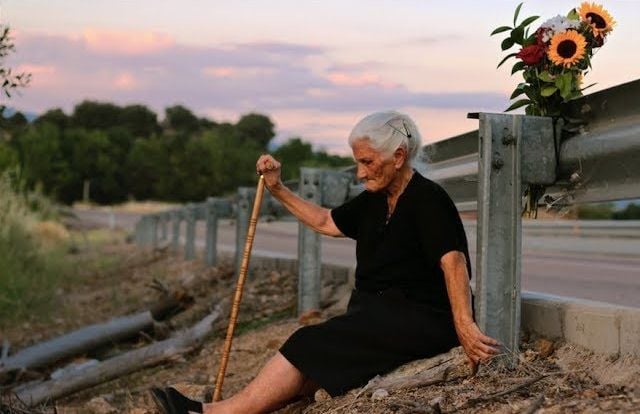El Silencio de Otros (2018)
If you’re looking for a documentary which illustrates the open wounds of the 1936-39 Civil War in modern-day Spain, look no further. Shot over a period of six years and produced by Pedro Almodóvar, ‘The Silence of Others’ follows family members of some of the victims of the bloody conflict and ensuing dictatorship of General Franco as they organise an international lawsuit against the country’s Pact of Forgetting.
Palomares (2021)
This three-part documentary series by Movistar+ tells the unbelievable story of how in 1966 two US military aircraft collided mid-air and mistakenly dropped four nuclear bombs over the small Almería town of Palomares. It’s a fascinating tale with interviews in English and Spanish that illustrate how poor and rural much of the country was fifty years ago, and how the Franco and US governments attempted to keep the locals in ignorance despite the life-threatening health risks. Here is an extract from the first episode.
Memoria de España (2000s)
This 27-part documentary series, each episode around an hour long, has everything you need to start becoming a Spanish history expert. RTVE’s Memory of Spain was made in the early 2000s and covers Spanish history in detail from prehistoric times, through to the Roman era, the Visigoths, the Moorish Conquest, the Reconquista and so on until the modern day.
Even though it’s only in Spanish with Spanish subtitles, it’s completely free to watch on RTVE Play.
Muchos hijos, un mono y un castillo (2017)
‘Lots of Kids, a Monkey and a Castle’ as it’s called in English is a fly-on-the-wall documentary directed by Spanish actor Gustavo Salmerón who captures the charming eccentricities of his mother Julita. It also acts as an homage to the strong character of Spanish mothers as well as showcasing family dynamics in Spain.
Barcelona era un fiesta (2010)
Documentary exploring the life and death of Catalan counterculture from 1970 to 1980, illustrating how Barcelona had its own hippie rebirth which left its imprint on the city’s current rebellious and multifaceted nature. You can watch the documentary in full below.
Juan Carlos: la caída del rey (2023)
Showtime’s new four-part documentary miniseries sheds light on former Spanish King Juan Carlos I’s personal life and allegations of corruption and abuse of power, leading up to his abdication in 2014. Most interviews, including that with former lover Corinna Larsen, are conducted in English. A must for anyone looking to understand Spaniards’ current disillusionment with their monarchy.
I Need A Dodge! Joe Strummer on the run (2014)
In 1997 The Clash’s Joe Strummer puts out a call on Spanish radio to help people find where he parked his car in Madrid 12 years earlier. Director Nick Hall embarks on the pursuit of the former rockstar’s Dodge whilst interviewing a number of musicians and friends who spent time with Strummer during these challenging times in his career. It’s an entertaining biographical piece which is likely to strike a chord with many Brits who escape to Spain for a fresh start.
Héroes invisibles (2015)
The story of the Lincoln Battalion, a 2,800-group of US volunteers who fought for the Republicans during the Spanish Civil War – is fairly well documented. What isn’t so well known is that 85 of these soldiers were Afro-Americans (Invisible Heroes as the documentary’s title states) who joined the cause as a means of fighting fascism and standing up for their own rights and freedom back home. It’s available on Spanish film streaming platform Filmin.
Camarón: Flamenco y Revolución (2018)
Camarón de la Isla, flamenco’s most illustrious male singer, modernised the Spanish gypsy music genre and was on his way to international stardom before dying of lung cancer at just 42. This biographical documentary is a must-watch for anyone who wants to better understand gitano culture and its most quintessential art: flamenco.
El Fin de ETA (2017)
Directed by seasoned documentary filmmaker Justin Webster, the Demise of ETA explains how the Basque separatist group came to down arms after years of violence and terrorist attacks, with interviews with some of key players in the process. Although it has no English subtitles, this documentary is available to watch for free on El País’s YouTube channel.



 Please whitelist us to continue reading.
Please whitelist us to continue reading.
Member comments